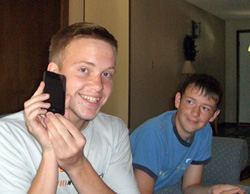What do you do when someone sends you a good video, a photo, or a link to an interesting news item? You share it. Maybe with a link on Facebook or Twitter; a blog if that’s your thing; or you simply email it to everyone in your address book. And some of them will do the same. It seems quite natural after 15 years of life on the net.
Now, what do you do when you hear something interesting, amusing or important on the radio? Assuming you’re not recording, your options are limited. You could call a friend, but by the time you reach them the song/interview/comedy bit is likely to be over.
All the good stuff you hear on the radio (or TV) pretty much stops when it reaches the listener. That never bothered me before because… well, where else _could_ it go after reaching me? There WAS no practical way to share it.
The web changed all that. Even the dumbest cat photo goes on and on and on.
Before hitting the record button or opening the mic, we should ask ourselves, “Can anyone link to what I am about to create?”

 Uncle Steve was a big hit with his belated graduation present, but after giving Ryan his new iPod Touch, he was a little distracted the rest of the weekend. I also miss a lot of birthdays so we did a little catch-up with the other two. They opted for PSP’s (Play Station Portables).
Uncle Steve was a big hit with his belated graduation present, but after giving Ryan his new iPod Touch, he was a little distracted the rest of the weekend. I also miss a lot of birthdays so we did a little catch-up with the other two. They opted for PSP’s (Play Station Portables).